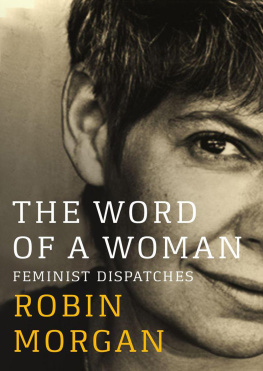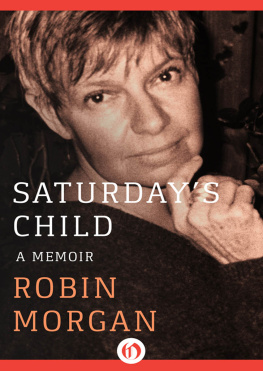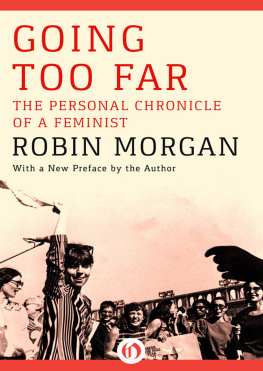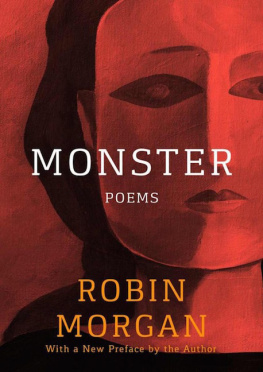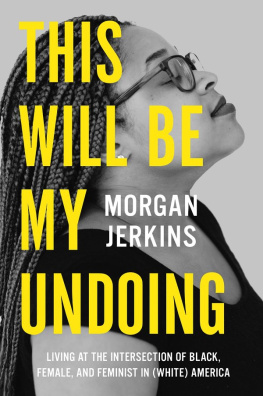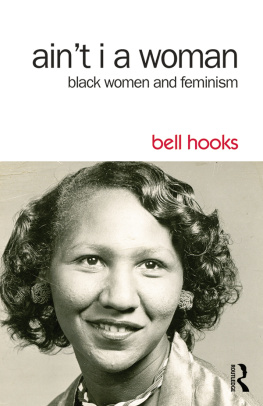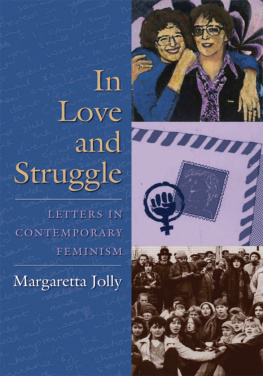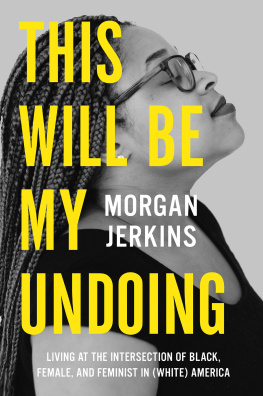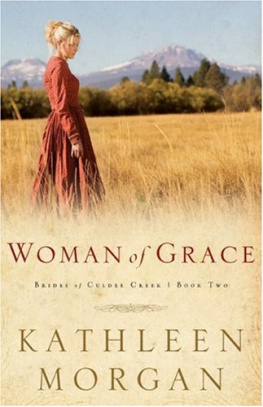
EARLY BIRD BOOKS
FRESH EBOOK DEALS, DELIVERED DAILY
LOVE TO READ ?
LOVE GREAT SALES ?
GET FANTASTIC DEALS ON BESTSELLING EBOOKS
DELIVERED TO YOUR INBOX EVERY DAY!

The Word of a Woman
Feminist Dispatches, 1968-1992
Robin Morgan

For Karen Rene Berry
Contents
Foreword to the First Edition
Composing an introduction to a selection of ones early writings through ones recent work can provoke a state of mind somewhere between nostalgia and hilarity. Some would call this perspective.
I write thison a wintery North American day in 1992during what the mainstream media have proclaimed the post-feminist era. In the late 1960s, at the beginning of the current wave of feminist activism, that media had authoritatively declared that this movement would never get off the ground. During the intervening quarter-century, those same pundits announced with dependably annual regularity that the death of feminism was imminent. ( I would call this period the beginning of the post- patriarchal era.)
Meanwhile, women all over the planet steadily continued to think, write, organize, and (O subversive act!) compare notes , pausing now and then in irritation, amusement, and incredulity, to gasp at how the reality in which we live can be so ignored or trivialized, at how most men seem able to go directly from a denial of our social existence to a declaration of our political demise without having passed through mere comprehension of what women really want.
We are told, for instance, that feminism is a Westernand recentnovelty. That this overlooks such phenomena as the twelfth-century Turkish harem revolts, the forty womens rights armies of Chinas 1851 Taiping Rebellion, the founding of Indonesias womens movement in 1904, the activism of the Argentinean National Feminist Party in 1918, and the contemporary worldwide Womens Movement, seems of little consequence. (I would term this willful myopia, plain old ahistoric ethnocentrism.)
We are told that younger women arent interested in feminism. That this ignores the proliferation of newly militant campus-based womens groups and national young feminists conferences, not to speak of such coalitions as The Third Wave and SOS (Students Organizing Students), seems not to count for much. Furthermore, those of us who lecture frequently at high schools and universities must be hallucinating when we address standard enthusiastic audiences of a thousand peoplemostly female and all in their late teens or early twenties. (I would name such disinformation age-bigotry.)
We are told that the so-called mens movement, complete with such overnight millionaires as Robert Bly and his wild men drum-beaters, is a new (and solemnly important) development. That this disregards the intense dedication of many male people, from Cro-Magnon times through mens sensitivity trends, to focus on anything rather than relate to a dirty floor (or a child) seems not to matter. (I would identify such hoary, hairy stunts as reliable backlash.)
We are told that feminist theory (whats left of it, one presumes?) can emanate only from academia, complete with deconstructionist and post-history frilly obfuscation. That this attempts to obliterate the work of such feminist theorists as Nawal El Saadawi of Egypt, Hilkka Pietil of Finland, Margarita Chant Papandreou of Greece, Marjorie Agosn of Chile, Kumari Jayarawenda of Sri Lanka, Tatyana Mamonova of Russia, and Gwendoline Konie of Zambiaonly a samplingas well as that of thousands of other activists and writers in the United States and abroad, seems to disconcert few academics. That such a proprietary attitude also violates two feminist principles of the original womens studies visionthat the personal is political and that every woman is an expert about her own lifeseems of even less concern. (I would grade such theses with an E or an Ofor elitism and opportunism.)
We in the United States are told how far female citizens have come, how the revolution has already been won. (I must have been in the shower when it happened.) That the year 1991 alone saw a flood of womens outrageat the Senate, over the Clarence Thomas confirmation hearings; at the legal system, over the manipulations in the William Kennedy Smith rape trial; and at the government, over continued massive cutbacks in social services and the feminization of povertygets conveniently slighted. (I would say that such visible, articulate fury constitutes the warning of a revolution yet to come.)
We are told that womens issues are limited to such subjects as reproductive freedom, freedom of sexual choice, the rising tide of violence against women (including rape, battery, sexual molestation, and harassment), equal-opportunity access to education and employment, childcare, and so forth. (This in itself does, I grant, constitute a considerable to do list.) But at this writing, most world leaders are busy congratulating themselves and each other on the achievements of the past twenty-four months. These leaders are, to be sure, concerned about the intensifying environmental crisis and distressed about the state of the worlds economy, but they console themselves by praising new growth industries dedicated to pollution control, and by referring to a global depression in such Orwellian terms as sluggish markets or stagflation.
All of the aboveand moreare womens issues.
The growing number of homeless people and those rioting in lines for bread in the former Soviet Union are women. Those civilians most devastated by the civil wars in Eastern Europe (wars that would in racist terms be called tribal if they were occurring on the African continent) are women and children. Those most threatened by the outlawing of abortion in Poland and the flood of pornography in Hungary, are women. In the wake of the Gulf War, women in liberated Kuwait still are not permitted to vote; women in Saudi Arabia still are not permitted to drive; women in Iraq still are busy mourning, starving, and trying to save wounded, diseased, and malnutritive children; and women throughout the Muslim world are fighting a new wave of religious fundamentalism. In South Africa, Nelson Mandela and Prime Minister de Klerck meet and smile at photo-opportunities, while the women of both the African National Congress and Inkatha protest their non-inclusion in the new draft constitution. That there is less threat of superpower nuclear war (thanks to the initiative of Mikhail Gorbachev) does not diminish the specter of nuclear accident , as nuclear-power plants proliferate and as the armaments industry refocuses its sights on the Third World marketand it is no coincidence that the expanding global anti-nuclear and environmentalism movements were begun by women and remain largely peopled by women.
All this and more constitutes the news between the lines, the action behind the scenesa deeper reality .
Meanwhile, in the tedious tradition of woman as object rather than subject, this feminist wave falls apparent prey to be written about, distorted, erased, simplified, analyzed, or compartmentalized by a new crop of objective historians with their own hidden political agendaswhether conservative, Marxist, male supremacist, or simply boring. So it becomes all the more crucial that we tell our own story, because, to paraphrase Walt Whitman: We were the women, we suffered, we were there.
This collectionthe dispatches from one participatory observeris, I hope, as volatile and versatile, as serious and funny, as energetic, eclectic, and elegantly nonlinear as the almost twenty-five years of feminist activism it reflects and describes. It includes some journalism, a number of theoretical articles, a bit of polemic, a few pieces that grew into book chapters and are here returned to their original core as intended essays, some meditations, one obituary, and one fable. When I have revised these pieces at all, it has been for the sake of clarity; I have made no revisionist changes in the politics or style, but have deliberately left intact all the contradictions and disagreements with myself that were (and are) part of this individual, literary, and historical process. The largest section is composed of new writings, almost all of them published here for the first time. For context, I have written short prefaces to each selection.
Next page
